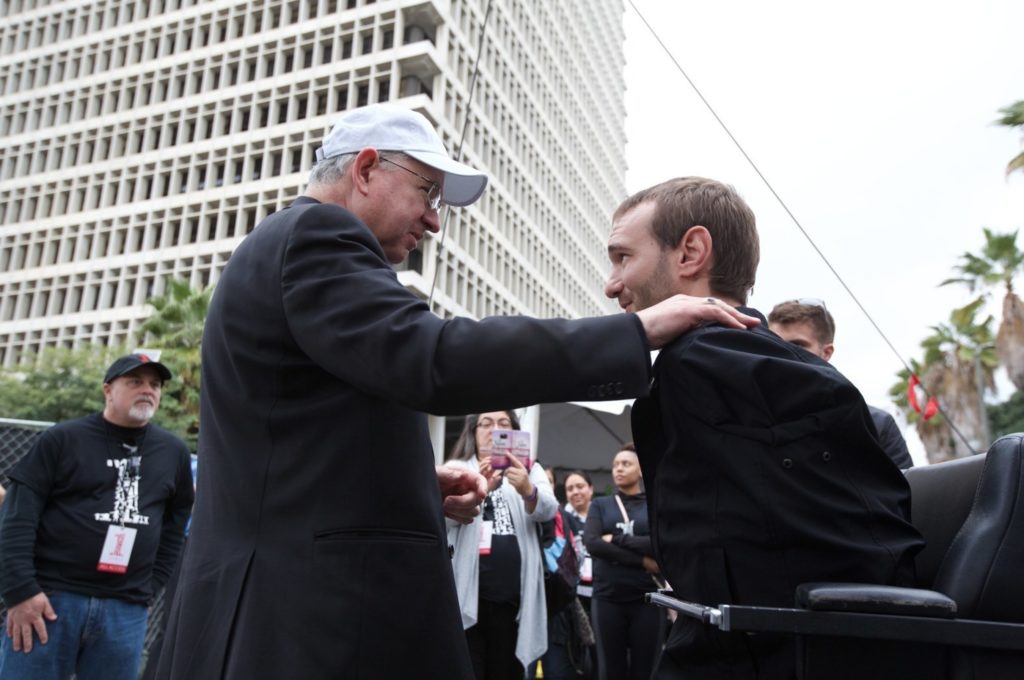As I write, I’m getting ready for OneLife LA, our annual walk for life and family festival on Jan. 21.
Once again this year, we will begin our joyful and peaceful procession from La Placita on Olvera Street and make our way to Los Angeles State Historic Park for an afternoon of family fun and inspiration, celebrating the gift of life.
When we started this event some years ago, we wanted to call attention to this beautiful truth that we are all children of God and that every human life is sacred.
The date of the event was chosen to mark a sad day in our nation’s history, Jan. 22, 1973, when the U.S. Supreme Court made abortion legal.
With OneLife LA, we recognized that the tragedy of abortion reflects the need for a deeper solidarity in our society, a deeper need for love, for what the Catechism calls “social charity.”
We don’t tend to think of love when we think about our politics or addressing conditions of injustice or inequality in our society. We think of love as something personal, an affection or a sentimental feeling between individuals.
But there is always a social dimension to love, as Jesus taught us in his great commandment to love God and to love our neighbor.
The love of God and the love of neighbor can never be separated. If we think we can love God without loving our neighbor, we are lying to ourselves, the Scripture says.
And love means working tirelessly and in concrete ways to improve the lives of our neighbors. The command to love our neighbors means working for a society where it is easier for people to live and to love; a society where the strong help the weak, and the vulnerable are protected.
Love dreams of a society where it is easier for people to be born and to raise families, where it is easier for people to grow old and to spend their lives with dignity.
“Let no one seek his own good, but the good of his neighbor,” St. Paul said. The command to love our neighbors sets out a path for our lives. The journey of love means every day moving further from our own cares and concerns, and opening our hearts more to the needs of others.
Jesus told us, “The poor you will always have with you.” That is a fact but also a command. There will always be poverty and suffering, loneliness and injustice. Jesus expects us to be close to everyone in need.
When someone challenged him, demanding to know, “Who is my neighbor?” Jesus responded with the great parable of the good Samaritan. Everyone is our neighbor, he told us. Everyone in need, everyone who suffers, everyone who does not have what they need to lead a dignified life.
He told us also that we would find God in our neighbor, that we would find him in the love that we show to those who are hungry and thirsty and in need of clothing, to migrants and refugees, and to those who are sick and those who are in prison.
The Church is God’s family and we are called to be our brothers’ and sisters’ keepers. We are called, as followers of Jesus, to the “service of love.” Love is our mission.
That is the theme of this year’s OneLife LA celebration, which is the first since the Supreme Court overturned its 1973 Roe v. Wade decision last June. It is a good opportunity for us to reflect on the importance of love, not only in our own lives but also in our society.
Jesus can “command” us to love because he has loved us first, and loved us to the end, as the Gospel tells us.
He came to show us the “human face” of God’s love. And what he showed us was a beautiful life given generously for others in love. He showed us a love that suffers and sacrifices, a love willing to lay down his own life to give life to us.
This is how we are meant to love. Included in that love is the demand that we work for a society that meets our neighbors’ needs, which are spiritual as well as material. We do not live by bread alone. People need to feel the warmth of human love. They need to know that they are cared for, that someone is there for them.
Pray for me and I will pray for you.
And let us ask holy Mary, our Blessed Mother, to help us build a society of love, where we live as brothers and sisters and know that we are children of God.

